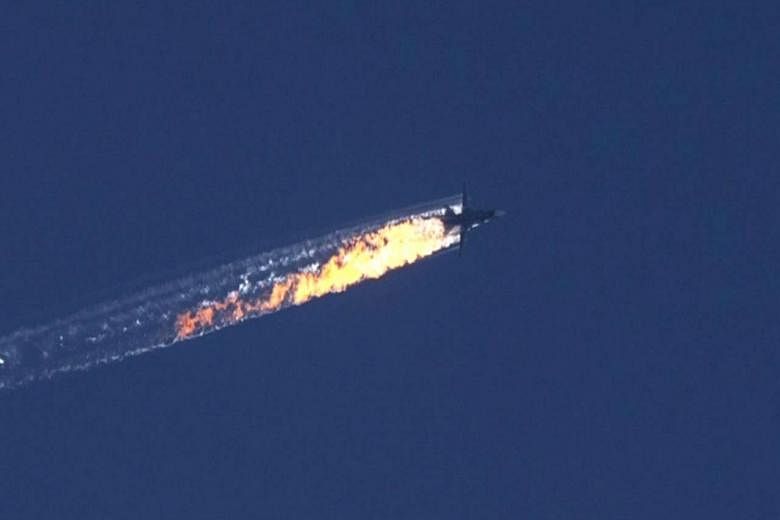About four years since the devastating civil war in Syria started, Russia's dramatic intervention on Sept 30 has shaken things up.
Tensions were escalated by Turkey's shooting down of a Russia jet on Tuesday (Nov 24), in a move condemned by Russia President Vladimir Putin.
Here are some reasons why Russia may have started its campaign in Syria:
1. FIGHT AGAINST ISIS
Though Russia has said it is helping in the fight against the Islamic State in Iraq and Syria (ISIS), some Western powers think the country is helping consolidate the power of Syrian President Bashar al-Assad - an ally of Russia - by targeting his enemies, including Syrian rebels fighting against his government.
The northern part of Syria, close to Turkey's border, where the Russian plane was shot down on Tuesday, is not known to have a significant ISIS presence.
2. DOMESTIC ISIS THREAT
While the threat of ISIS gripping Syria cannot be understated, Russia would also be troubled by the threat of ISIS domestically.
On top of the long-standing problem of militants in the north Caucasus region, those in regions like Dagestan have also declared their allegiance to ISIS. There is also a likelihood that militants trained by ISIS in Syria will commit attacks in Russia.
And the ISIS threat has already hit Russia, with Moscow admitting last week that an ISIS-claimed bomb blew up a plane of Russian tourists that took off from Egypt.
3. REGIONAL INFLUENCE
The former Soviet Union, which Russia was the biggest state of, used to be the dominant power in the Middle East, but had in recent decades seen its influence diminish. Syria is Russia's sole remaining ally and the only place in the region where the once-mighty Russian navy still has a base.
Western powers had been intervening in Syria's civil war for years, and have actively called for Mr Assad's removal, but they have failed to unseat him.
Mr Putin's sudden move to send troops to support Mr Assad can be seen as him not wanting to lose Russia's last ally in the Middle East, and also wanting to have a say in Mr Assad's successor when he eventually departs.
It is also part of the wider effort to counter what Russia sees as the United States' influence globally in instilling democratic revolutions in countries like Ukraine after the Soviet era.
4. NATIONAL PRIDE
As Russia's influence diminished not only in the Middle East but globally, Mr Putin has been on a crusade to restore national pride.
His decisive and muscular intervention in the Syrian conflict - coming soon after the annexation of Crimea from Ukraine and the involvement in Ukraine's own civil war - has allowed him to project an aggressive image, and renewed Russia's standing, for better or for worse, in the eyes of the world.
The fact that it took Western powers, especially the United States, by surprise in its intervention, leaving them floundering for a response, is another important point. It shows that Russia can act unilaterally and in total secret, which contrasts with the style of Western leaders who tend to talk first and act later, if at all.
And after Russia has acted, there is little Western powers can do except issue condemnations, short of a direct confrontation, which no country has the appetite for.
Mr Putin remains popular among the Russian people precisely for this rapacious image, despite the faltering Russian economy.
5. ENERGY SUPPLIES
Observers have suggested that the Russian intervention is about energy supplies.
The Middle East is crucial to the global supply price of oil and gas, which are also Russia's chief trading commodities.
Saudi Arabia's decision to hold down prices in an effort to regain market share against shale oil producers has damaged the Russian economy.
By intervening in Syria, it is sending a message to the Saudis that it is a player in the politics of oil.
6. DISTRACTION FROM UKRAINE
Another benefit of the Syria campaign is that it diverts attention from the war in Ukraine, which Russia had a hand in after taking over Crimea. Pro-Russia rebels also started a revolt in east Ukraine. The crisis went so far as to be responsible for the downing of a Malaysia Airlines plane, reports claim.
Russia was slapped with sanctions over the saga, but now the West has something else to fill its Russia roster with besides Ukraine.
Bonus trivia: The rate of sorties being flown by Russian jets over Syria has been described as impressive, as they seem to be generating close to a theoretical maximum number possible for 32 fixed-wing combat aircraft - if the information provided by Russia about their operations is accurate.
As many as 96 fixed-wing combat aircraft sorties per day can be carried out, assuming maximally efficient logistics and maintenance.
Most military officials predicted a rate of 20 sorties per day.
In the latest report, Russia's air force flew 141 sorties and hit 472 terrorist targets in Syria over the Nov 21 and 22, the RIA news agency quoted the Russian Defence Ministry as saying on Monday (Nov 23).
Sources: Reuters, Time.com, the Wall Street Journal, Washington Post, The National Interest, Straits Times archives


